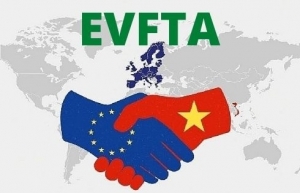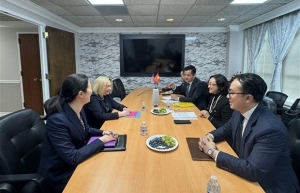Geopolitical tensions prompt a rethinking of trade
In fact, by preventing oil and gas imports from Russia, the EU created a supply shortage that increased oil and gas prices globally. As Russia was still able to sell its oil and gas to countries like India and China, it actually benefitted from the increased prices that the EU sanctions induced. Ultimately, these sanctions helped Russia to increase its income from oil and gas sales.
 |
| Dr. Daniel Borer, Lecturer, RMIT University Vietnam |
It is tough for the Western community to enforce the Russian sanctions everywhere, especially as many nations have no interest in following them.
The global economy, in the meantime, suffers. Or does it truly? The impressive expansion of globalisation the world experienced in the second half of the 20th century was abruptly halted with the 2008 global financial crisis. As the world recovered from this shock, the US-China trade war ignited, which again brought a crack into global trade.
Gradually, countries were able to arrange their trade around the US-China trade war, benefitting third countries. As economies were recovering from the US-China clash and trade was picking up, the pandemic hit everybody, bringing global trade to an abrupt halt as factories closed and supply chains broke down. As the world gradually recovered from the pandemic, global trade again suffered major disruptions.
It seemed that the golden times of globalisation had finally hit a dead-end as multinational corporations were considering relocating production nearer to their customers in a move towards domestic manufacturing and what is now called “near-shoring”. Also, as the Western and Eastern blocks started to re-emerge, trade became more directed towards political partners, which led to the concept of “friend-shoring”.
In retrospect, it appeared that we hit an all-time high of trade as a percentage of world GDP in 2007, when 61 per cent of all global production was traded internationally. But despite some people solemnly burying globalisation as a phenomenon of the past, the unthinkable happened – global trade resurrected.
The latest available data from 2022 show an impressive recovery of trade as a percentage of world GDP in the previous two years from 52 up to 63 per cent, an unprecedented record high.
True, a rethinking took place, where trade has become less global and more regional, but it seems that countries have quickly adapted to this new strategy.
Especially in Asia, the Regional Comprehensive Economic Partnership, signed in 2020, gave birth to the largest trading block ever created. The Comprehensive and Progressive Agreement for Trans-Pacific Partnership is also boosting trade in the region.
Geopolitically, we may fear that the future is as uncertain as ever. Economically and trade-wise we may smile, for the future looks as bright as ever. Still, the development of tensions in the West could have severe impacts on Vietnam.
Given the current scenarios, Vietnam is facing several challenges as well as opportunities. It would be beneficial to strengthen trade relations with friendly, nearer partners like Australia and New Zealand, countries with large potential for Vietnamese trade, but that have largely been untapped.
Also, trade in raw materials, especially in rare earth elements (REEs), should be coordinated. REEs are required to build wind turbines, electric vehicles, any types of screens, and medical devices among others.
According to the United States Geological Survey, Vietnam has the second-largest reserves of REEs globally with 22 million metric tonnes, after China, which has 44 million MT and before Russia and Brazil, both with 21 million MT.
These REEs are a strategic key future resource, needed for the green revolution, and Vietnam happens to be a key global player in this industry. South Korea is planning to mine REEs in Vietnam. While this initiative should be welcomed, it begs the question of how this strategic resource can benefit the global position and economic strength of the country.
The closer trade ties with countries in the region are making Vietnam an attractive destination for foreign direct investment which, at first sight, should come as good news.
Still, it is necessary to create an economic environment where not only affordable labour is the selling point of Vietnam for such investing. Key infrastructure projects that the government has already initiated will help to improve Vietnam’s position as a key global player.
Foreign investors often mention the lack of skilled labour as one deterrent to investing in the country. While university graduates can help, it is also necessary to build up vocational training, so that formally trained electricians, plumbers, mechanics and so on are available for ventures.
The Vietnamese government has put in place several measures and implemented key projects that are conducive to sustained growth and economic stability. Coupling these measures with redirecting trade closer and to more friendly countries as well as solidifying its position as a foreign investment manufacturing hub in the region will equip the country for any storm that may loom.
 | UK-Vietnam trade pact already demonstrating value The United Kingdom-Vietnam trade relationship is poised to reach new heights, buoyed by the celebration of 50 years of UK-Vietnam bilateral relations last year, guided by the continued implementation of the UK-Vietnam Free Trade Agreement (UKVFTA), and further boosted by the UK joining the Comprehensive and Progressive Trans-Pacific Partnership (CPTPP). |
 | Obstacles still to be ironed out to improve EVFTA’s standing Despite an increase in trade thanks to a bilateral free trade deal, the European Union is expecting Vietnam to remove obstructions that are impeding the bloc’s trade and investment into the country. |
 | Vietnam, US strengthen trade relations Deputy Minister of Industry and Trade Phan Thi Thang had a meeting with Deputy Assistant US Trade Representative (USTR) for Southeast Asia and the Pacific Sarah Elleman, within the framework of Vice State President Vo Thi Anh Xuan’s recent working visit to the US. |
What the stars mean:
★ Poor ★ ★ Promising ★★★ Good ★★★★ Very good ★★★★★ Exceptional
Related Contents
Latest News
More News
- Citi economists project robust Vietnam economic growth in 2026 (February 14, 2026 | 18:00)
- Sustaining high growth must be balanced in stable manner (February 14, 2026 | 09:00)
- From 5G to 6G: how AI is shaping Vietnam’s path to digital leadership (February 13, 2026 | 10:59)
- Cooperation must align with Vietnam’s long-term ambitions (February 13, 2026 | 09:00)
- Need-to-know aspects ahead of AI law (February 13, 2026 | 08:00)
- Legalities to early operations for Vietnam’s IFC (February 11, 2026 | 12:17)
- Foreign-language trademarks gain traction in Vietnam (February 06, 2026 | 09:26)
- Offshore structuring and the Singapore holding route (February 02, 2026 | 10:39)
- Vietnam enters new development era: Russian scholar (January 25, 2026 | 10:08)
- 14th National Party Congress marks new era, expands Vietnam’s global role: Australian scholar (January 25, 2026 | 09:54)

 Tag:
Tag:



















 Mobile Version
Mobile Version